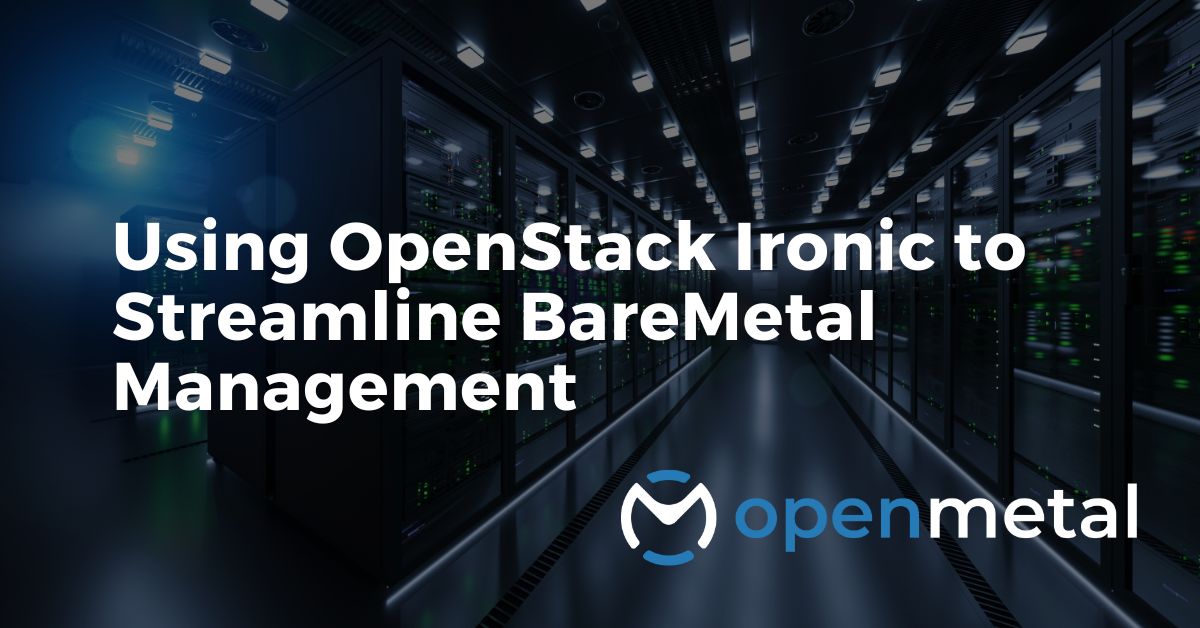Ironic is a component of the OpenStack framework that specializes in provisioning and managing bare metal servers/machines instead of virtual machines. It can be utilized independently or as part of an OpenStack Cloud setup. Ironic seamlessly integrates with various OpenStack services, such as Keystone for identity management, Nova for compute, Neutron for networking, Glance for image management, and Swift for object storage.

The primary objective of the OpenStack Ironic project is to provide a unified interface for managing hardware resources in a cloud environment. It supports a range of protocols, including commonly used ones like PXE (Preboot Execution Environment) and IPMI (Intelligent Platform Management Interface), as well as vendor-specific remote management protocols. This capability allows cloud operators to efficiently manage a diverse fleet of servers using a single interface.
Furthermore, Ironic enables the Compute service (Nova) to treat physical servers as if they were virtual machines. This means that operators can provision, manage, and schedule bare metal servers in a manner similar to virtual machines, ensuring a consistent and streamlined approach to managing resources within an OpenStack cloud environment.
How Does Ironic Make it Easy to Manage Bare Metal?
Ironic simplifies the management of bare metal machines in several ways:
Unified Interface
Ironic provides a unified interface for managing bare metal servers within an OpenStack cloud environment. This means that operators can use consistent tools and commands to provision, deploy, and manage both virtual machines and bare metal machines, eliminating the need for separate management systems.
Integration with OpenStack Services
Ironic seamlessly integrates with other OpenStack services, such as Keystone, Nova, Neutron, Glance, and Swift. This integration enables smooth coordination between different cloud infrastructure components, making it easier to manage and operate bare metal servers in conjunction with virtual machines and network resources.
Abstraction of Hardware Complexity
Ironic abstracts the complexities of managing bare metal hardware. It supports various hardware management protocols, including PXE and IPMI, allowing operators to perform common tasks like remote booting, power management, and hardware diagnostics in a standardized manner across different server models and vendors. This abstraction shields operators from dealing with low-level hardware intricacies.
Automated Provisioning
Ironic automates the provisioning process for bare metal servers. Operators can define server configurations and deployment templates using declarative descriptions, which can be easily replicated and scaled. Ironic handles the deployment process, including network configuration, operating system installation, and software stack setup, streamlining the provisioning of new servers.
Scalability and Flexibility
Ironic is designed to handle large-scale deployments and heterogeneous server fleets. It allows for managing a diverse set of hardware resources, accommodating various server models and vendors. This scalability and flexibility make it suitable for cloud operators dealing with complex and diverse bare metal environments.
How Does Ironic Integrate With Other OpenStack Services?
Ironic integrates with several OpenStack services to provide a comprehensive bare metal management solution. Here’s how Ironic works with each of these services:
Keystone
Ironic leverages Keystone for identity management and authentication. By integrating with Keystone, Ironic ensures that only authorized users and services can access and manage the bare metal resources. Keystone provides the necessary authentication and authorization mechanisms to secure access to the Ironic API.
Nova
Ironic works closely with Nova, the OpenStack Compute service. It allows Nova to treat physical servers as if they were virtual machines. This integration enables operators to manage bare metal servers using the same familiar Nova APIs and commands they use for virtual machines. Ironic provides a driver within Nova that communicates with the Ironic API to orchestrate the provisioning, deployment, and management of bare metal instances.
Neutron
Neutron, the OpenStack Networking service, integrates with Ironic to provide network connectivity to bare metal servers. Ironic leverages Neutron to assign network addresses, configure VLANs, security groups, and other networking settings for the bare metal instances. This integration ensures that the networking requirements of the bare metal servers are properly handled within the OpenStack environment.
Glance
Glance, the OpenStack Image service, is utilized by Ironic to manage the operating system and other software images used for deploying bare metal servers. Operators can store and manage different image types in Glance, including base operating system images and custom images. Ironic interacts with Glance to retrieve the required images during the provisioning process, ensuring that the correct software stack is installed on the bare metal servers.
Swift
Ironic integrates with Swift, the OpenStack Object Storage service, for storing deployment and configuration data. Swift provides a reliable and scalable storage infrastructure for Ironic to store various metadata, configuration files, and other relevant information associated with the bare metal instances. This integration ensures that the necessary data is securely stored and accessible during the lifecycle of the bare metal servers.
By working in conjunction with Keystone, Nova, Neutron, Glance, and Swift, Ironic seamlessly integrates with the wider OpenStack ecosystem. It leverages the capabilities of these services to provide a comprehensive solution for provisioning, deploying, and managing bare metal servers within an OpenStack cloud environment.
Ironic simplifies the management of bare metal servers by offering a unified interface, integrating with OpenStack services, abstracting hardware complexity, automating provisioning, and supporting scalability. It allows cloud operators to efficiently and consistently manage their hardware resources within an OpenStack cloud environment, regardless of the underlying server infrastructure.
More on the OpenMetal Blog…
Bare Metal: A Critical Component of the Modern IaaS Strategy
The adoption of Infrastructure-as-a-Service (IaaS) is on the rise as businesses seek to harness the scalability, flexibility, and cost-effectiveness…Read More
OpenStack in Today’s World: How Organizations Harness its Power
OpenStack is the most popular open source cloud computing platform, but this comes as little surprise to the open source community…Read More
Creating A Cloud Environment For Artificial Intelligence On OpenStack
OpenStack projects and open source software can be used to create a cloud environment that’s ideal for building…Read More
Test Drive
For eligible organizations, individuals, and Open Source Partners, Private Cloud Cores are free to trial. Apply today to qualify.
Subscribe
Join our community! Subscribe to our newsletter to get the latest company news, product releases, updates from partners, and more.












































